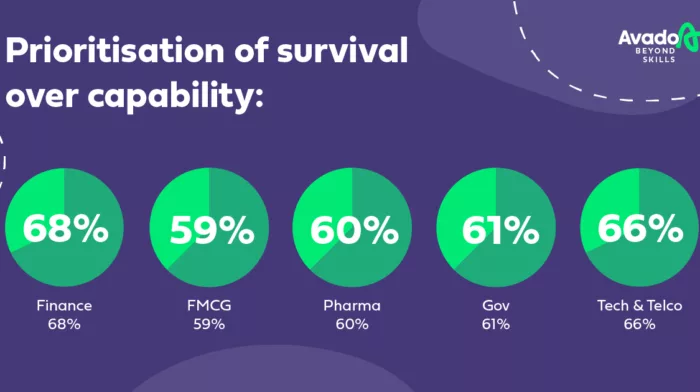Earlier this month, we launched our Beyond Skills report. Through surveying more than 1,000 executives and senior leaders across several sectors, we assessed the growing capability chasm. We found that this chasm was identified by 60% of respondents as a real problem in their organisation. But what is a capability chasm? We define it as the critical imbalance between the capabilities people have and the ones they need.
A lot of businesses have changed since 2020. So, we mapped how that chasm compares to the changing attitudes around learning and development. We found that developing peoples’ capabilities is essential to business success. Across the board, 71% of businesses that saw growth last year did increase their training budgets, even though each sector has its own unique challenges.
But what can you learn about the capabilities chasm in the pharmaceutical industry? Read on to find out.
What the Beyond Skills report highlighted for the pharma sector
Majority of the work done in the pharma sector is very specialised, and many employees are highly educated, often to a PhD level. In light of that, it isn’t surprising that the pharma people we spoke to reported the smallest capabilities gap of the five sectors we surveyed. But, there is still a gap, and it’s showing up in softer skill areas that aren’t usually taught in universities, like agile ways of working and becoming more data-driven in areas like marketing and sales.
The pharma sector does have a reputation for slow-moving change when it comes to things like innovating on strategy. So, its relatively positive predictions for capability development might be surprising. Based on our research, this sector is becoming more willing to adapt to new methods of learning. They were also least likely to wish there had been more investment in learning and development in 2020. Respondents in this sector also anticipated that, even if their training budgets decreased this year, they would return in five to eight months.
In spite of that more positive outlook, 61% of learning and development leaders in the pharma sector said they struggled to make business leaders appreciate the value of upskilling.
How does pharma differ from other sectors?
The other four sectors we surveyed had both similar and different opinions surrounding the capabilities chasm.
- Financial services respondents were the most likely to report a prioritisation of survival over capability at 68%.
- Tech and telco, much like pharma, went through massive growth in 2020. They highly value digital transformation and learning and development, with 52% of respondents in this sector reporting increased investments in training.
- Fast-moving consumer goods reported the second highest rate of profit decline in any sector, and saw the most cuts to learning and development budgets.
- Government and public services had to adapt quickly, and faced more red tape than the other sectors. When it came to wishing for more investment in skill development, they reported the highest numbers at almost three quarters.

What should you do next?
As the Beyond Skills report has shown us, the pharma sector is unique, and 2020 has only highlighted this. There is a shift in the way this sector is working, with an always-increasing demand to get things done faster. In such a rapidly-changing space, investing in capabilities is the key to sustainable growth.
That potential for growth is there. By 2030, there will be 133,000 jobs added in the life sciences sector in the UK. But, to make the most of that growth, things like collaboration, innovation and agility all need to be prioritised. Based on the Beyond Skills report, we know that this isn’t happening the way that it should. That’s particularly true when it comes to senior leadership’s perception of capability development’s value.
That means, if you are in the pharma sector and you’re looking for ways to bridge the capability gap, you need training that creates real, long-term change. It needs to shift mindsets throughout the company, and it needs to include your leadership team.
That kind of approach to upskilling will not only help you future-proof the skillsets of the very qualified employees you have, but it will help with retention and recruitment. You need to foster a culture of learning, top to bottom, and embed skill development into everything you do.
About Avado
At Avado, we believe that true transformation isn’t digital, it’s human. We build professional future skills to help diverse talent access and accelerate careers through award-winning learning experiences that deliver tangible and measurable impact. We upskill people, uplift culture and future-proof organisations in a fast-moving world.
Avado is proud to be a people-transformation partner to some of the largest and most innovative organisations in the UK including: Google, BT, NHS, British Airways, UK Civil Service, Legal & General and AstraZeneca.
To find out more, visit www.avadolearning.com

 4 min read
4 min read 


